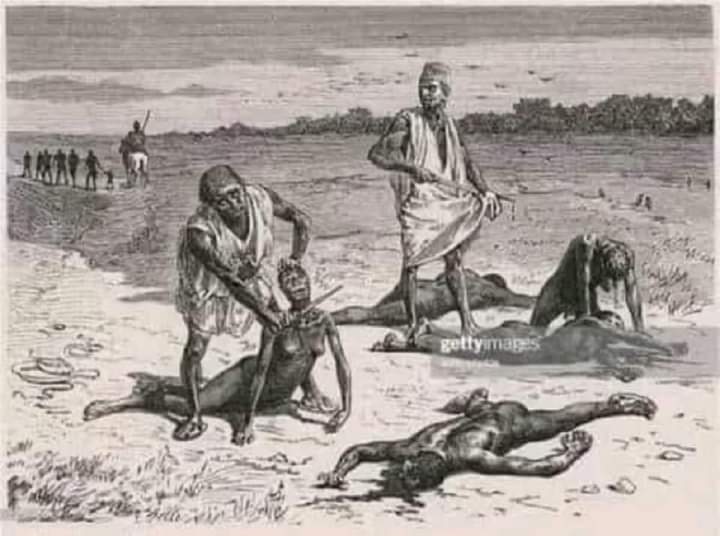The story of Kurunmi is one that draws tears from the eyes of people who feel pity for a man who stood firm for tradition.
There was a time in the history of Yoruba where the heir to the throne is killed whenever the king dies. This tradition came about because it was discovered that a lot of princes killed their fathers so they could ascend the throne and become king instead.
It was believed that if the heirs were killed alongside their fathers, kings would live longer on the throne.
During this period, Alaafin Atiba was the paramount ruler of the Oyo empire, and he appointed Kurunmi, the son of Esiele as the Aare-ona-Kakanfo ( the generalissimo of the whole Yoruba warriors).
As it was with tradition, a king and an Aare-ona-Kakanfo cannot stay in the same town because their wield similar powers, so Kurunmi was assigned to Ijaiye, where he was given the power to lord over.
One day, Alaafin Atiba summoned the kings and lords of the neighboring towns and told them he wished to change tradition. Present at the meeting were kings like the Timi of Ede, Balogun Ibikunle of Ibadan, and Kurunmi himself.
When they were seated, Atiba came down from his throne and held the sword of Ogun (the Yoruba god of iron) in his right hand, and the bolt of Sango (the Yoruba god of lightning and thunder) in his left. He charged the royalties present to swear by the sword and bolt that after his death, his son Aremo Adelu will be made king after his demise.
Kurunmi disagreed immediately, and he reminded Alaafin Atiba that according to the tradition, the moment Atiba does, his son Adelu must follow suit. Other royalties tried to persuade Kurunmi, but he was adamant. When he couldn’t convince them, he walked out in anger and headed for Ijaiye.
The other kings and chiefs went home to their people to inform them of the latest developments. When Balogun Ibikunle of Ibadan told his chiefs the news, one of the chiefs Basorun Ogunmola took the matter up and suggested they wage war against Kurunmi.
Kurunmi had once captured Ogunmola who had a secret affair with his wife. He captured him, tied him to a stake like a goat and fed him ashes as food. As a form of revenge, Ogunmola proposed war against Kurunmi.
Alaafin Atiba sent emissaries to Kurunmi to change his mind, but he remained adamant, and when Alaafin Atiba saw that he would not change his mind, he sent two calabash bowls to Kurunmi. One of the calabashes contained an effigy of a pair of twins (Yoruba symbol of peace), while the other calabash contained gunpowder (Yoruba symbol of war).
Kurunmi immediately chose war and sent the emissaries back to Atiba. Immediately, Kurunmi summoned his chief warrior Balogun Ogunkoroju and told him to prepare for war.
As part of the preparations for war, Kurunmi consulted the oracle, and the oracle warned him not to go to war with Ibadan because he would lose the war. Kurunmi was not going to have any of it, and he pestered the oracle to tell him what to do to win the war.
The oracle then told Kurunmi that in order for him not to lose the war, he must not cross the River Ose, which was the boundary between Ijaiye and Ibadan. Kurunmi agreed, and went ahead to plan for the war against Ibadan.
While Kurunmi was making preparations, the Ibadan warriors, led by Ogunmola went to meet the people of Ęgba who were said to possess very powerful charms.
The Ęgba people then prepared a potent charm called Eedi (a charm that causes someone or a group of people to ignore warnings or dare something that will harm them). The Eedi was set out to the River Ose so that the Ijaiye warriors will be tempted to cross the river.
When the war came, Kurunmi sent his five sons to war to fight the Ibadan people. During the face-off, Ijaiye warriors soundly defeated the Ibadan warriors, and the remaining Ibadan warriors fled back, crossing the River Ose.
Unfortunately for Kurunmi, his warriors fell to the potency of the Eedi, and they crossed the River Ose, believing that they had momentum, and that they could chase the Ibadan soldiers far away.
Immediately they crossed the river, their charms failed them, and they were killed in thousands by the warriors of Ibadan who had set a trap for them. Kurunmi suffered heavy losses, and lost all his five sons in the war.
Basorun Ogunmola mocked him and sent a message to him that he was coming for his head. On hearing the news of the death of his daughter and his men, Kurunmi became very devastated and suicidal, but while he grieved, he held on to his belief that tradition remains tradition, and that he does not regret standing firm in the face of corruption.
Kurunmi committed suicide by taking poison, and he was thrown into the river Ose according to his wishes so that Basorun Ogunmola won’t have the luxury of cutting his head and hanging it in shame.
Peoplesmind


